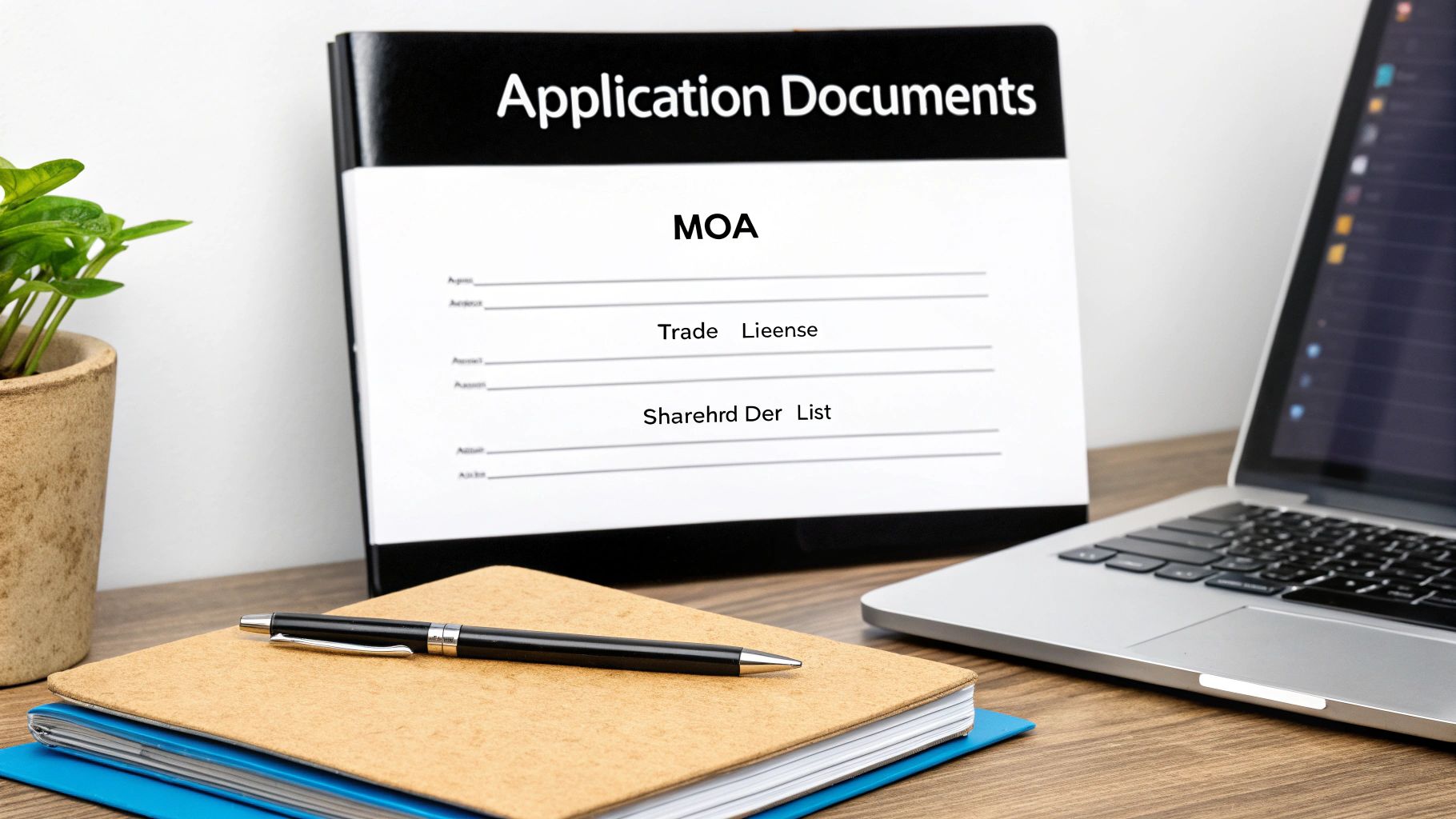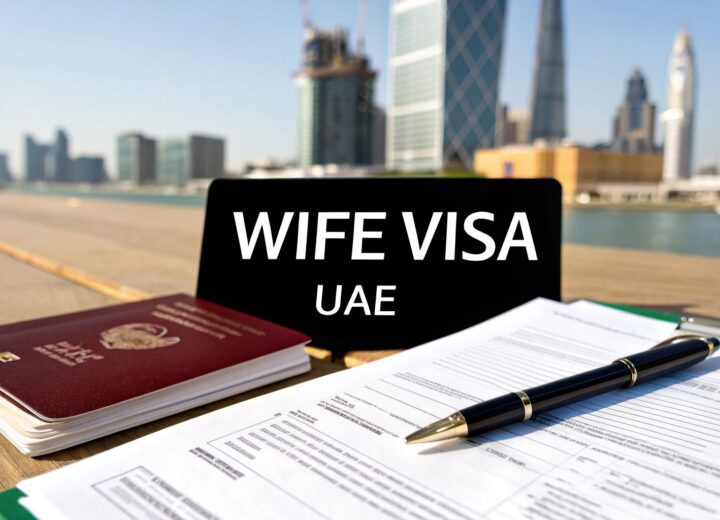To successfully open a bank business account in the UAE, you need to walk in prepared. It’s all about putting together a solid application that proves your company is legitimate and has real potential. This means gathering key documents—like your trade license, a well-thought-out business plan, and clear shareholder details—before you even think about approaching a bank.
Getting this groundwork right from the start is genuinely the most critical factor for a smooth approval.
Laying the Groundwork for Your UAE Bank Account
Opening a corporate bank account is a major milestone for any new business here, but let's be honest, the process can feel overwhelming. Financial institutions in Dubai, Sharjah, and Abu Dhabi have strict due diligence requirements, and for good reason—they need to maintain the integrity of the UAE's financial system.
For you, this means a successful application is built on a foundation of solid preparation and complete transparency. Before you even book a meeting with a banker, your focus should be on assembling the core pillars of your application. This isn't just about ticking boxes; it’s about presenting a professional and compelling case for why the bank should want to do business with you.
Core Documentation Requirements
Banks will scrutinise your company’s legal structure, shareholder details, and proof of economic substance. Without these, your application simply won't move forward. This is where partnering with a specialist in Mainland and Freezone Company Formation across the UAE can make all the difference, helping you sidestep common hurdles from day one and ensuring your submission is not just complete, but persuasive.
The infographic below breaks down the three essential pillars for any application.
Think of this trio—your trade license, business plan, and shareholder info—as the bedrock of your application. They prove your legal standing, strategic direction, and ownership structure all at once.
Beyond the Basics of Business Setup
While those documents are non-negotiable, proper groundwork goes a bit deeper. For instance, the entire process of company formation in the UAE is directly linked to your banking success. A correctly structured entity, whether it’s on the Mainland or in a Freezone, makes the banking application significantly easier down the line.
It's also worth noting how fast the UAE's financial sector is evolving. The local banking-as-a-service (BaaS) market was valued at around USD 71 billion in 2024 and is projected to hit over USD 125 billion by 2032. This boom, driven by government support for the digital economy, influences how banks assess new clients.
Key Takeaway: Banks in the UAE aren't just looking for a registered company; they're looking for a viable business with a clear purpose. Your initial documents need to tell a coherent and credible story about your venture's potential and its commitment to local regulations.
Preparing for Financial Scrutiny
Your business plan has to be more than just a document. It must clearly lay out your vision, target market, and financial projections. Banks use this to understand your revenue model and assess their risk. Trust me, vague or unrealistic plans are a massive red flag for compliance officers.
Similarly, all shareholder information must be completely transparent. This includes passports, visa copies, and proof of address for all ultimate beneficial owners (UBOs). Any ambiguity here can lead to frustrating delays or even an outright rejection. As you prepare, don't forget the importance of your corporate tax registration, as this is another key piece of the financial compliance puzzle.
When opening an account, the specific documents you'll need can vary slightly depending on whether your company is registered on the Mainland or in a Freezone. Here’s a quick comparison to give you a clearer picture.
Mainland vs Freezone Bank Account Essentials
| Requirement | Mainland Company | Freezone Company |
|---|---|---|
| Trade License | Issued by the Department of Economic Development (DED) in the respective emirate. | Issued by the specific Freezone authority (e.g., DMCC, DAFZ). |
| Memorandum of Association (MOA) | A notarised MOA is mandatory for most legal structures. | The MOA is typically provided by the Freezone authority as part of the setup package. |
| Office Lease Agreement (Ejari) | A registered physical office lease (Ejari) is almost always required to prove substance. | A "flexi-desk" or smart office lease provided by the Freezone is often sufficient. |
| Shareholder & UBO Documents | Passports, visas, and Emirates IDs for all shareholders and managers. Proof of address is crucial. | Similar requirements, but the Freezone may hold some of this on file from the setup process. |
| Business Plan | A detailed plan showing market analysis, operations, and financial projections is essential. | A comprehensive business plan is equally important, especially for new ventures. |
| Proof of Economic Substance | Banks will look for genuine business activity connected to the UAE economy. | Substance requirements are still key, but the nature of the business (e.g., international trade) is understood. |
While the core principles are the same, you can see how the source of the documents and the expectations around physical presence differ. Knowing these nuances ahead of time is key to a smooth process.
By meticulously preparing these foundational elements, you present your business as a credible, low-risk partner, paving the way for a successful and swift account opening.
Assembling Your Application Documents

Successfully opening a business bank account in the UAE all comes down to immaculate documentation. I can't stress this enough. This isn’t just about gathering papers; it’s about presenting a coherent, professional file that tells your company's story.
Banks are trained to spot inconsistencies. A single missing attestation or an outdated document can grind the entire process to a halt. Think of each document as a puzzle piece—when put together correctly, they create a clear picture of a legitimate, well-run business. This is your first real chance to build trust with a financial institution.
The Non-Negotiable Corporate Files
Let's start with the basics. The core of your application is the set of legal documents that prove your company exists and has the right to operate in the UAE. These are the absolute fundamentals. Any slip-up here will trigger an immediate query or an outright rejection.
Your application file must include a complete and valid set of these documents:
- Trade Licence: This is your primary proof of legal operation. Make sure it’s current and accurately reflects your business activities. An expired licence is one of the most common—and easily avoidable—mistakes we see.
- Memorandum of Association (MOA) / Articles of Association (AOA): These documents spell out your company's rules, objectives, and shareholder roles. The bank will scrutinise your MOA to confirm who the authorised signatories are and understand the company's legal structure.
- Shareholder & UBO Documentation: You’ll need clear, coloured copies of passports, residence visas, and Emirates IDs for all shareholders and Ultimate Beneficial Owners (UBOs). You'll also need recent utility bills as proof of address. Transparency here is key.
- Certificate of Incorporation: This is the official document confirming your company’s registration. If you want to dive deeper into its importance, you can learn about the Certificate of Incorporation in the UAE in our detailed guide.
These files are the legal backbone of your application. Our Corporate PRO Services and Attestation Services specialists meticulously verify each one to ensure every detail aligns and meets the strict requirements set by UAE banks.
Crafting a Credible Business Plan
Beyond the legal paperwork, your business plan is probably the most influential document you'll submit. It’s where you go from proving your company is legal to proving it's viable. A vague or poorly researched business plan is a massive red flag for any banker.
Your plan needs to be a practical, data-driven document. It should provide clear, confident answers to the questions every banker has in mind:
- What problem does your business solve?
- Who are your target customers?
- How will you generate revenue?
- What are your financial projections for the next 12-24 months?
- What is the source of your initial capital?
A strong business plan demonstrates foresight and diligence. It shows the bank that you've done your homework and are serious about your venture's success, making you a much lower-risk client.
For instance, an e-commerce startup's plan should detail its supply chain, marketing strategy, and projected customer acquisition costs. A consultancy's plan, on the other hand, would focus on the founders' expertise, client pipeline, and billing structure. We help our clients tailor these narratives so they are both ambitious and grounded in reality.
Supporting Documents That Build Confidence
Finally, a few supporting documents help paint the full picture of your operations and financial standing. Some might seem minor, but leaving them out can cause unnecessary delays. Think of them as the finishing touches that show you’ve thought of everything.
Be ready to provide:
- Office Lease Agreement (Ejari): For mainland companies, this is critical proof of a physical presence. Free zone companies can often use their flexi-desk or smart office agreement instead.
- Company Profile: A brief one or two-page summary of your business, its founders, and its mission. This adds a personal touch and gives context to the formal application.
- Bank Statements: You'll typically need six months of personal bank statements for all shareholders to demonstrate financial stability and the source of funds.
- Board Resolution: This is a formal document, signed by the board, that authorises the opening of the bank account and officially names the signatories.
Putting this comprehensive package together is a detailed process that demands precision. Each document serves a purpose, from validating your legal framework to proving your commercial viability. By ensuring every piece of paper is perfect, you build an application that radiates professionalism and dramatically increases your chances of a swift, successful approval.
Choosing the Right Bank for Your Business
Picking the right financial partner is easily one of the most critical decisions you'll make when you set up your business in the UAE. Let's be clear: not all banks are the same. What works perfectly for a huge mainland trading company could be a complete disaster for an international tech startup in a free zone.
Making the wrong choice isn't just an inconvenience. It can lead to serious operational headaches, surprisingly high fees, and endless compliance frustrations down the line. This is about more than just finding a bank with a branch near your office; it’s about finding a true partner whose services, risk appetite, and digital tools actually match your business model. Get this wrong, and it will cost you.
Traditional Institutions vs. Digital Challengers
The UAE's banking scene gives you a full spectrum of options, from massive, well-established local banks to slick, modern digital banks. The big traditional banks often boast huge branch networks, a massive portfolio of complex financial products, and decades of history. They can be a solid choice for businesses that need face-to-face services, trade finance facilities, or hefty lines of credit.
On the other end, you have the digital banks, which are becoming incredibly popular, especially with startups and foreign entrepreneurs. They usually offer a much smoother sign-up process, lower (or even zero) minimum balance requirements, and clean, easy-to-use mobile apps. The trade-off? You might not get the same personalised relationship manager or the complex financial instruments that a bigger, more established bank can offer.
Key Factors to Evaluate in a Bank
It’s easy to get bogged down in the marketing fluff when you're comparing banks. To cut through the noise, you need to focus on the things that will directly impact your company's financial health and day-to-day operations.
Before you even think about signing an application, make sure you have clear answers to these questions:
- Minimum Balance Requirements: This is a big one. Some banks demand an average monthly balance anywhere from AED 25,000 to AED 100,000 just to avoid steep monthly penalties. Can your new business comfortably handle that from the get-go?
- International Transfer Fees: If you're dealing with clients or suppliers overseas, these fees can bleed you dry. You need to compare the costs for both sending and receiving international payments (SWIFT charges).
- SME-Specific Products: Does the bank actually care about small businesses? Look for tailored services like accessible business loans, simple payroll solutions, or dedicated SME relationship managers who understand your challenges.
- Industry Acceptance: Some banks are notoriously conservative. They might be wary of what they consider "high-risk" industries, like crypto, certain types of consulting, or companies with complicated international ownership.
Choosing a bank that understands and welcomes your industry is paramount. An institution that is sceptical of your business model from the start will likely create continuous compliance hurdles for your transactions later on.
The financial world is also changing fast, thanks to new tech. Open banking in the UAE is taking off, and some forecasts predict the MENA fintech sector could pull in up to USD 4.5 billion by 2025. This move towards digital-first banking is making everything more connected and user-friendly.
How PRO Deskk's Expertise Simplifies Your Choice
This is exactly where getting professional guidance makes all the difference. Trying to figure out each bank's unwritten rules and internal risk policies is almost impossible if you're new to the UAE market. We leverage our long-standing relationships with a wide range of UAE banks to your advantage through our 24/7 support service.
We know which banks are friendlier to new free zone companies, which ones have the best digital platforms for international founders, and which are a better fit for mainland businesses with specific needs. For example, our team can offer expert help and insights for an Emirates NBD account opening, one of the biggest and most popular banks in the region.
And while our expertise is firmly rooted in the UAE, it can be helpful to see how things are done elsewhere. For perspective, this detailed guide to opening a business bank account in Turkey shows the kinds of documents and processes that are common in other major business hubs.
By looking at your business plan and financial forecasts, we help you find a bank that doesn't just tick a box—it actively wants to support your growth. This strategic matchmaking saves you weeks of wasted time and the frustration of a potential rejection, ensuring you kick off your business journey with the right financial partner from day one.
Mastering the Application and Interview
Getting your application package submitted is a huge step forward, but don't pop the champagne just yet. The next stage—the bank's internal review and your interview—is where things get serious. This is where your business story is put under a microscope, and honestly, it’s where a lot of entrepreneurs trip up. It’s rarely about missing documents; it’s about failing to tell their story with clarity and confidence.
Once we submit your file, it doesn't just sit on a desk. It goes straight into the bank’s due diligence and compliance pipeline. And this isn't a quick skim-read; it’s a thorough deep dive. Compliance officers will connect the dots between every piece of information you've provided, searching for consistency, transparency, and a solid understanding of your business.
What the Bank is Really Looking For
The review timeline can feel like an eternity, often taking anywhere from one to four weeks. During this time, the bank is doing one primary thing: assessing risk. They are legally required to perform ‘Know Your Customer’ (KYC) checks to ensure they aren’t accidentally facilitating any illegal activities. They are piecing together the puzzle you've handed them, looking for a clear picture of a legitimate, viable, and low-risk business.
Here’s a peek inside a compliance officer’s checklist:
- Does the story make sense? If you're licensed as a Mainland tech consultancy, they expect to see contracts and invoices related to IT services—not random, unexplained international commodity trades.
- Where did the money come from? The source of your initial investment capital needs to be crystal clear and legitimate. Vague or undocumented funding is one of the biggest red flags you can possibly raise.
- Are you actually here? Is your business a genuine UAE operation? They'll look at your office lease, employee visas (if you have them), and the overall business plan to confirm you have real economic substance.
- Is everything consistent? Every single detail has to line up. The activities on your trade licence must perfectly match the description in your business plan, which, in turn, must match the answers you give in your interview.
Our job is to see these checks coming. We pre-screen your entire profile to iron out any wrinkles, making sure this internal review goes off without a hitch and setting you up for a successful meeting.
Acing the All-Important Bank Meeting
That interview, whether it’s face-to-face or over a video call, is your final chance to breathe life into your application. Think of it as a conversation, not an interrogation. The bank manager wants to see that the person behind all the paperwork is credible, knowledgeable, and professional.
Your main goal is to explain your business model clearly and simply. Ditch the industry jargon. Be ready to break down exactly how you make money. If you sell products online, talk about your supply chain and how you find customers. If you offer professional services, describe your typical client and how you manage projects from start to finish.
Key Takeaway: The bank interview is your chance to build a human connection and reinforce the trust your documents have already established. Confidence and transparency are your greatest assets.
How to Answer the Common Questions Like a Pro
Bankers usually ask a fairly predictable set of questions. They're designed to verify the information they already have and to get a feel for how well you know your own business. It's smart to practice your answers to these common queries:
- "Can you describe your business activities in your own words?" Don't just list what's on your licence. Frame your answer around the value you bring to your customers.
- "Who are your main clients and suppliers?" Be specific. If you can, mention the geographic regions you'll be working with. For example, "Our main suppliers are based in Germany, and we are targeting clients across the GCC."
- "What are your expected monthly transactions?" Give them realistic numbers for both the volume and value of payments coming in and going out. This helps them assign the correct risk profile to your account.
- "Can you explain the source of your startup capital?" Be direct and honest. For instance, "The initial capital is from my personal savings, which I accumulated over ten years working as an engineer. I have the bank statements to back this up."
Let’s say you’re running a Freezone company that exports goods. Your narrative has to be seamless. You’d explain how you source your products, who your international buyers are, and the mechanics of how payments will be received. Any mismatch between what you say and what's in your business plan will immediately create doubt.
By preparing for this final stage, you transform the interview from a nerve-wracking hurdle into a final confirmation of your credibility. It becomes the last confident step you take towards securing that all-important UAE business bank account.
Avoiding Common Application Pitfalls

So why do so many applications to open a bank business account in the UAE get stuck in a frustrating loop of delays or, worse, get rejected outright? It's rarely a single, dramatic error. More often, it's a collection of small, avoidable mistakes that, when added up, paint a picture of a high-risk or unprepared applicant in the eyes of the bank.
These common tripwires can turn what should be a straightforward step into a major headache, especially for international entrepreneurs who aren't yet familiar with the finer points of UAE banking regulations. Knowing what these are ahead of time is the first step to sailing right past them.
Incomplete Documentation and Missing Attestations
This is, hands down, the biggest reason applications fail. Submitting your file with a missing shareholder utility bill, an expired trade licence, or a Memorandum of Association that isn't properly attested is like trying to start a car without the key. The process just won't go anywhere.
UAE banks have absolutely zero wiggle room on this. Their compliance checklists are strict, and every single document has to be there, be valid, and be correctly authenticated.
Key Takeaway: A 'nearly complete' application is just an incomplete application. Banks won't even start their review on a file that has gaps. Meticulous pre-vetting to ensure every page is perfect before it even gets to the bank is non-negotiable.
Here’s a real-world example: An e-commerce startup based in a Sharjah freezone had its application stalled for over three weeks. The culprit? The proof of address for one international shareholder was a digital bank statement, which that specific bank's policy didn't accept. We stepped in with our cost-effective business setup solutions and helped them quickly find an acceptable alternative, getting the application moving again.
Misunderstanding Minimum Balance Rules
It's easy to be drawn in by a bank's marketing, but many new business owners don't read the fine print on account maintenance. They successfully open an account, only to be slapped with hefty monthly fees because their average balance drops below the required threshold—which can be anywhere from AED 25,000 to over AED 100,000.
This not only eats into precious startup cash but also starts the banking relationship off on the wrong foot. It's vital to pick an account where the financial requirements match your company’s real cash flow, not just your future ambitions.
Navigating High-Risk Business Classifications
Certain business activities are automatically flagged as "high-risk" by banks. This doesn't mean you can't get an account, but it absolutely means you're going to face a much deeper level of scrutiny.
Sectors that often get a closer look include:
- General Trading: The broad nature of this licence can be a red flag if you don't back it up with a very specific and clear business plan.
- Jewellery and Precious Metals: High-value transactions and Anti-Money Laundering (AML) concerns put this category under the microscope.
- Companies with Complex Ownership Structures: Multiple layers of corporate ownership, particularly those involving offshore entities, will trigger a deep dive from the compliance team.
- Crypto-Related Activities: While things are changing, most traditional banks are still extremely cautious about businesses that handle digital assets.
Another case we handled: A consultancy firm with an international ownership structure was rejected by two major banks. Their business model was perfectly sound, but their application didn't properly explain the role of the offshore parent company. Our experts came in to reshape the application narrative, clarifying the source of funds and operational flow. This led to a successful opening with a bank that was a much better fit for their structure.
This is an area where the entire financial ecosystem is evolving. The open banking market in the Middle East and Africa is poised for massive growth, projected to jump from USD 5.6 billion in 2025 to USD 19.2 billion by 2031. This digital shift is slowly pushing banks toward more data-driven risk assessments, but for now, caution is still the default setting. You can learn more about the trends shaping the MEA open banking market.
The PRO Deskk Advantage in Sidestepping Pitfalls
So, how do we turn these potential roadblocks into a clear path to approval? Think of our expertise as your shield. We don’t just forward your documents; we strategically manage the entire process to stop these problems before they even start.
This table breaks down how professional support directly tackles the most common reasons for rejection.
Common Rejection Reasons and How to Solve Them
| Rejection Reason | Why It Happens | Our Solution |
|---|---|---|
| Incomplete or Incorrect Documents | Applicants miss small but critical details like attestations, expiry dates, or specific formatting rules. | We run a multi-point verification on every single document, ensuring 100% compliance with your chosen bank's unique checklist before submission. |
| Weak Business Plan | The plan is too vague, the financial projections seem unrealistic, or it doesn't clearly explain the business model. | Our team helps you polish your business plan to present a clear, convincing, and low-risk narrative that bankers will understand and trust. |
| Poor Bank Selection | The chosen bank's internal risk policies don't align with the company's industry or ownership structure. | We use our extensive network to match you with a bank that actually understands and is open to your specific business sector, whether you're on the Mainland or in a Freezone. |
| Mismatched Information | Details shared in the interview don't line up with the submitted documents, raising immediate red flags. | We prepare you for the bank interview, coaching you on how to articulate your business model clearly and consistently. |
In the end, avoiding these pitfalls comes down to preparation, strategy, and insider knowledge. By partnering with experts who navigate these waters every day, you turn the daunting task of opening a bank account into just another smooth and successful step in your UAE business journey.
Still Have Questions? We've Got Answers
If you're looking to open a business bank account in the UAE for the first time, you probably have a lot of questions running through your mind. It's a journey that can feel complex. Below, we’ve tackled some of the most common queries we get from entrepreneurs just like you, offering straightforward advice to help you get started.
Can I Open a UAE Business Bank Account Remotely?
This is probably the most frequent question we hear, and the answer isn't a simple yes or no. You can get almost everything done from abroad – all the paperwork, submissions, and even the initial approvals can be handled remotely.
However, UAE banking rules are very clear on one point: at least one shareholder must physically be in the UAE for the final signing and verification. This is a non-negotiable part of the bank's Know Your Customer (KYC) compliance.
This is where our team comes in. We manage every single step leading up to that final meeting. We make sure your application is pre-approved and everything is in order, so your trip to the UAE is quick, efficient, and just for that final, successful signature.
What Is the Minimum Balance for a UAE Corporate Account?
There's no single answer here, as the minimum balance requirements can vary dramatically from one bank to another. Some of the newer digital banks are quite popular with startups because they offer accounts with no minimum balance requirement at all.
On the other hand, the more established, traditional banks will often ask for an average monthly balance anywhere from AED 25,000 to AED 100,000. If your balance dips below their threshold, you'll start seeing service fees.
It's absolutely vital to pick a bank whose requirements match your company's expected cash flow. Our job is to help you find those cost-effective options that are a perfect fit for your business, allowing you to enjoy UAE tax benefits for international entrepreneurs.
How Long Does It Take to Open a Business Bank Account?
Honestly, the timeline can be all over the place. We've seen accounts opened in just a few business days, while others have dragged on for over four weeks. What makes the difference? It comes down to a few things: how fast the bank processes applications, the complexity of your company structure, the nationalities of the shareholders, and—most importantly—how well your application is put together.
The single best way to speed things up is to submit a perfect application from the very beginning. A complete, professionally organised file makes all the difference. Our Corporate PRO services are designed to create rejection-proof applications, and we actively follow up with our banking contacts to keep things moving.
Will Banks Reject a New Business with No Trading History?
Not at all. UAE banks work with new companies and startups every single day. They're completely used to it. But without a track record of sales and transactions, the bank's decision rests almost entirely on the quality of your business plan.
Your business plan has to do the heavy lifting. It needs to clearly explain your business model, who your customers are, and provide realistic financial projections. It also has to be transparent about where your initial funding is coming from. We have extensive experience helping new businesses—including those navigating Golden Visa on Property and Investor Visa applications—craft a compelling story that gives bankers the confidence they need to say "yes."
Ready to open your UAE business bank account without the hassle? Our specialists in Mainland Company Formation in Dubai, Sharjah & Abu Dhabi and Freezone Company Formation across the UAE are here to help, ensuring your application is perfect from the start.
📞 Call Us Now: +971-54-4710034
💬 WhatsApp Us Today for a Free Consultation





